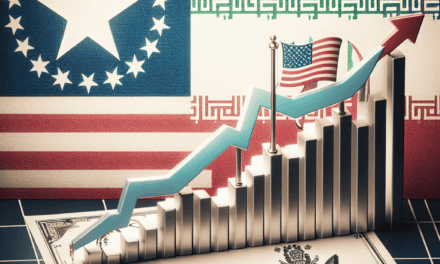“Wall Street Bonuses Surge: A New Era of Financial Optimism Begins!”
Introduction
In a notable shift within the financial sector, Wall Street bonuses are projected to rise for the first time since 2021, according to a recent report by a leading consultancy firm. This anticipated increase marks a significant turnaround from the previous years of stagnation and decline, reflecting a more optimistic outlook in the financial markets and improved performance across various sectors. The report highlights key factors contributing to this upward trend, including robust economic recovery, increased trading volumes, and a resurgence in investment banking activities. As financial institutions prepare for this change, the implications for employee compensation and industry dynamics are expected to be profound, signaling a renewed era of growth and opportunity on Wall Street.
Impact Of Rising Wall Street Bonuses On The Financial Sector
The financial sector is poised to witness a significant shift as Wall Street bonuses are set to increase for the first time since 2021, according to a recent report by a leading consultancy firm. This development marks a notable change in the compensation landscape, reflecting broader economic trends and the evolving dynamics within the financial industry. As bonuses rise, the implications for the financial sector are multifaceted, influencing everything from employee morale to market competitiveness.
To begin with, the anticipated increase in Wall Street bonuses is largely attributed to the robust performance of financial institutions over the past year. Despite global economic uncertainties, many banks and investment firms have reported strong earnings, driven by a resurgence in trading activities and a rebound in deal-making. This financial upswing has provided firms with the resources to reward their employees more generously, thereby fostering a sense of optimism within the industry. Moreover, the increase in bonuses is expected to enhance employee retention, as competitive compensation packages are crucial in attracting and retaining top talent in a highly competitive market.
Furthermore, the rise in bonuses is likely to have a ripple effect across the financial sector, influencing compensation strategies beyond Wall Street. As major financial institutions set the precedent for higher bonuses, smaller firms may feel compelled to follow suit to remain competitive in the talent market. This could lead to a broader recalibration of compensation structures, potentially elevating the overall standard of living for financial professionals. Additionally, the increase in bonuses may stimulate consumer spending, as recipients of these bonuses are likely to invest in luxury goods, real estate, and other high-value assets, thereby contributing to economic growth.
However, it is important to consider the potential challenges associated with rising bonuses. While higher compensation can boost morale and productivity, it may also exacerbate income inequality within the financial sector. The disparity between top earners and lower-level employees could widen, leading to potential discontent and calls for more equitable compensation practices. Moreover, the focus on bonuses as a primary form of compensation may encourage short-term risk-taking behavior, as employees strive to meet performance targets that trigger higher payouts. This could pose risks to the stability of financial institutions, particularly if market conditions become volatile.
In addition to these internal considerations, the increase in Wall Street bonuses may attract scrutiny from regulators and the public. In the wake of past financial crises, there has been heightened awareness and criticism of excessive compensation practices within the financial industry. As bonuses rise, firms may face pressure to justify their compensation strategies and demonstrate that they align with long-term value creation and ethical standards. This could lead to increased regulatory oversight and calls for greater transparency in compensation practices.
In conclusion, the anticipated rise in Wall Street bonuses represents a significant development within the financial sector, with far-reaching implications for firms, employees, and the broader economy. While the increase is likely to enhance competitiveness and stimulate economic activity, it also presents challenges related to income inequality, risk management, and regulatory scrutiny. As the financial sector navigates this evolving landscape, it will be crucial for firms to balance the benefits of higher bonuses with the need for sustainable and equitable compensation practices. Ultimately, the impact of rising Wall Street bonuses will depend on how effectively these challenges are addressed and how the industry adapts to the changing economic environment.
Factors Driving The Increase In Wall Street Bonuses
In a notable shift from recent trends, Wall Street bonuses are projected to rise for the first time since 2021, according to a recent report by a leading consultancy firm. This anticipated increase marks a significant departure from the stagnation and decline observed over the past two years, driven by a confluence of factors that are reshaping the financial landscape. Understanding these factors provides insight into the dynamics at play within the financial sector and the broader economic environment.
To begin with, the resurgence in Wall Street bonuses can be attributed to the robust recovery of the global economy following the disruptions caused by the COVID-19 pandemic. As economies worldwide have gradually reopened, there has been a marked increase in economic activity, leading to higher corporate earnings and improved financial market performance. This economic upswing has, in turn, bolstered the profitability of financial institutions, creating a favorable environment for increased compensation packages.
Moreover, the resurgence in mergers and acquisitions (M&A) activity has played a pivotal role in driving up bonuses. The past year has witnessed a flurry of M&A deals, as companies seek to capitalize on strategic opportunities and consolidate their market positions. This surge in deal-making has generated substantial fees for investment banks, thereby enhancing their revenue streams and enabling them to reward their employees with more generous bonuses. Consequently, the heightened M&A activity has become a key driver of the anticipated increase in Wall Street bonuses.
In addition to M&A activity, the resurgence of the initial public offering (IPO) market has also contributed to the upward trajectory of bonuses. The IPO market has experienced a renaissance, with a significant number of companies going public to tap into investor enthusiasm and raise capital. This resurgence has not only provided lucrative opportunities for investment banks but has also underscored the importance of skilled financial professionals in navigating complex market conditions. As a result, firms are incentivized to offer competitive bonuses to attract and retain top talent in this highly competitive landscape.
Furthermore, the evolving regulatory environment has had an indirect impact on bonus structures. In recent years, regulatory bodies have implemented measures aimed at enhancing transparency and accountability within the financial sector. While these regulations have imposed certain constraints on compensation practices, they have also encouraged firms to adopt more performance-based bonus structures. This shift towards performance-driven incentives aligns employee interests with organizational goals, fostering a culture of excellence and driving overall business success.
Additionally, the competitive labor market within the financial sector cannot be overlooked as a contributing factor. As financial institutions vie for top-tier talent, they are compelled to offer attractive compensation packages to secure the services of skilled professionals. This competition has intensified in recent months, as firms seek to bolster their teams in response to growing market opportunities. Consequently, the need to attract and retain talent has prompted firms to increase bonuses as part of their broader compensation strategies.
In conclusion, the anticipated increase in Wall Street bonuses for the first time since 2021 is the result of a confluence of factors, including the global economic recovery, heightened M&A and IPO activity, evolving regulatory frameworks, and a competitive labor market. These elements have collectively created a favorable environment for financial institutions to reward their employees with enhanced compensation packages. As the financial landscape continues to evolve, it will be interesting to observe how these factors shape the future trajectory of Wall Street bonuses and the broader financial sector.
Comparison Of Wall Street Bonuses: 2021 Vs. Current Year
In recent years, Wall Street bonuses have been a topic of significant interest and scrutiny, reflecting broader economic trends and the financial sector’s health. According to a recent report by a leading consultancy firm, Wall Street bonuses are set to increase for the first time since 2021, marking a notable shift in the financial landscape. This development invites a comparison between the bonuses awarded in 2021 and those anticipated in the current year, offering insights into the evolving dynamics of the financial industry.
In 2021, Wall Street bonuses were influenced by a confluence of factors, including the economic recovery following the initial impact of the COVID-19 pandemic. The financial markets experienced a robust rebound, driven by unprecedented fiscal and monetary stimulus measures. Consequently, many financial institutions reported strong earnings, which translated into substantial bonuses for their employees. However, this period of prosperity was tempered by underlying uncertainties, such as inflationary pressures and supply chain disruptions, which began to emerge towards the end of the year.
Transitioning to the present, the landscape has shifted considerably. The current year has been characterized by a more complex economic environment, with persistent inflation, geopolitical tensions, and fluctuating interest rates posing challenges to financial markets. Despite these headwinds, the consultancy report suggests that Wall Street firms have managed to navigate these challenges effectively, resulting in improved financial performance. This resilience is attributed to strategic adjustments, such as cost-cutting measures, diversification of revenue streams, and increased focus on technology-driven solutions.
Moreover, the anticipated increase in bonuses this year can be linked to the financial sector’s adaptation to a rapidly changing environment. Firms have increasingly embraced digital transformation, leveraging technology to enhance efficiency and customer experience. This shift has not only bolstered profitability but also positioned these institutions to capitalize on emerging opportunities in areas such as fintech and sustainable finance. As a result, employees are likely to see the benefits of these strategic initiatives reflected in their compensation packages.
Another factor contributing to the expected rise in bonuses is the competitive labor market. The financial industry, like many others, is grappling with talent shortages and heightened competition for skilled professionals. To attract and retain top talent, firms are compelled to offer more attractive compensation packages, including higher bonuses. This trend underscores the importance of human capital in driving organizational success and highlights the need for firms to remain agile in their talent management strategies.
In comparing Wall Street bonuses from 2021 to the current year, it is evident that the financial sector has undergone significant transformation. While the earlier period was marked by recovery and optimism, the present is characterized by resilience and adaptation in the face of ongoing challenges. The anticipated increase in bonuses reflects not only improved financial performance but also the strategic foresight of firms in navigating a complex and dynamic environment.
In conclusion, the projected rise in Wall Street bonuses for the current year signifies a positive development for the financial industry, offering a stark contrast to the trends observed in 2021. As firms continue to adapt to evolving market conditions, the focus on innovation, talent retention, and strategic growth will remain paramount. This comparison of Wall Street bonuses serves as a testament to the sector’s ability to thrive amidst uncertainty and underscores the critical role of strategic adaptation in achieving long-term success.
Consultant Insights On The Future Of Wall Street Compensation
In a recent report, a leading consultancy firm has projected an increase in Wall Street bonuses for the first time since 2021, marking a significant shift in the financial landscape. This anticipated rise in compensation comes after a period of stagnation and decline, driven by various economic and market factors. The report suggests that the financial sector is poised for a rebound, with several key indicators pointing towards a more favorable environment for investment banks and financial institutions.
To understand the implications of this development, it is essential to consider the broader economic context. Over the past few years, Wall Street has faced numerous challenges, including regulatory changes, geopolitical tensions, and the lingering effects of the global pandemic. These factors have collectively contributed to a cautious approach in compensation strategies, as firms prioritized stability and risk management over aggressive growth. However, recent trends indicate a shift in this paradigm, as economic conditions begin to stabilize and market confidence gradually returns.
One of the primary drivers behind the projected increase in bonuses is the resurgence of market activity. With the global economy showing signs of recovery, there has been a notable uptick in mergers and acquisitions, initial public offerings, and other financial transactions. This surge in activity has, in turn, generated higher revenues for investment banks, creating a more conducive environment for rewarding employees. Furthermore, the report highlights that technological advancements and digital transformation initiatives have played a crucial role in enhancing operational efficiency, thereby boosting profitability.
In addition to market dynamics, the competitive landscape of the financial sector has also influenced compensation trends. As firms vie for top talent, there is a growing recognition of the need to offer attractive remuneration packages to retain and attract skilled professionals. This has led to a reevaluation of bonus structures, with many institutions opting to increase variable pay components to align with performance and market conditions. Consequently, employees can expect more substantial rewards for their contributions, reflecting the value they bring to their organizations.
Moreover, the report underscores the importance of aligning compensation strategies with long-term business objectives. As financial institutions navigate an increasingly complex and interconnected world, there is a heightened emphasis on sustainable growth and responsible business practices. This has prompted a shift towards more balanced compensation models that incorporate both short-term incentives and long-term value creation. By fostering a culture of accountability and aligning employee interests with organizational goals, firms can ensure that their compensation strategies support sustainable success.
While the projected increase in Wall Street bonuses is a positive development, it is not without its challenges. The report cautions that firms must remain vigilant in managing risks and maintaining a prudent approach to compensation. As the financial sector continues to evolve, there is a need for ongoing adaptation and innovation to address emerging trends and potential disruptions. By staying attuned to market dynamics and regulatory changes, firms can position themselves to capitalize on opportunities while mitigating potential risks.
In conclusion, the anticipated rise in Wall Street bonuses marks a significant turning point for the financial sector, reflecting a more optimistic outlook for the future. As firms navigate this evolving landscape, they must balance the need for competitive compensation with the imperative of sustainable growth and responsible business practices. By doing so, they can ensure that their compensation strategies not only reward employees but also contribute to the long-term success of their organizations.
Economic Implications Of Increased Bonuses In Wall Street
The recent report by a leading consultancy firm indicating that Wall Street bonuses are set to increase for the first time since 2021 has sparked considerable interest and discussion among economic analysts and industry insiders. This development, while seemingly a positive sign for the financial sector, carries with it a range of economic implications that extend beyond the confines of Wall Street. To understand the broader impact, it is essential to consider the factors contributing to this anticipated rise in bonuses and the potential ripple effects on the economy.
Firstly, the increase in Wall Street bonuses can be attributed to a combination of improved financial performance and strategic adjustments within the industry. After a period of economic uncertainty and market volatility, financial institutions have managed to stabilize and, in some cases, thrive. This resurgence is largely due to a combination of robust market activity, increased deal-making, and a resurgence in trading volumes. Consequently, firms are in a better position to reward their employees, reflecting a renewed confidence in their financial standing.
Moreover, the anticipated rise in bonuses is likely to have a significant impact on consumer spending. Historically, Wall Street bonuses have been a substantial component of the income for many financial professionals, and an increase in these bonuses often translates into higher disposable income. This, in turn, can lead to increased consumer spending, particularly in sectors such as luxury goods, real estate, and high-end services. As financial professionals receive larger bonuses, their spending patterns can stimulate economic activity, potentially benefiting businesses that cater to this demographic.
However, it is important to consider the potential downsides of increased Wall Street bonuses. One concern is the exacerbation of income inequality. While bonuses may boost the earnings of those in the financial sector, they do little to address the wage stagnation experienced by workers in other industries. This disparity can lead to social and economic tensions, as the gap between high earners and the rest of the population widens. Policymakers and economists must therefore consider measures to ensure that economic growth is inclusive and benefits a broader segment of society.
Furthermore, the increase in bonuses may also have implications for the labor market within the financial sector. As firms compete to attract and retain top talent, they may feel pressured to offer more competitive compensation packages. While this can be advantageous for employees, it may also lead to increased operational costs for firms, potentially impacting their profitability in the long term. Companies will need to strike a balance between rewarding their employees and maintaining financial sustainability.
In addition, the rise in bonuses could influence regulatory discussions surrounding compensation practices in the financial industry. In the aftermath of the 2008 financial crisis, there was significant scrutiny on the role of bonuses in encouraging excessive risk-taking. As bonuses increase, regulators may revisit these discussions to ensure that compensation structures do not incentivize behavior that could jeopardize financial stability.
In conclusion, the anticipated increase in Wall Street bonuses marks a significant development in the financial sector, with far-reaching economic implications. While it signals a recovery and renewed confidence within the industry, it also raises important questions about income inequality, labor market dynamics, and regulatory oversight. As the financial sector navigates this new landscape, it will be crucial for stakeholders to consider these factors to ensure that the benefits of increased bonuses are realized without compromising broader economic stability.
Employee Morale And Retention: The Role Of Bonuses
In the ever-evolving landscape of financial markets, employee morale and retention remain pivotal concerns for firms striving to maintain a competitive edge. A recent report by a leading consultancy firm has revealed that Wall Street bonuses are set to increase for the first time since 2021, a development that could significantly impact employee satisfaction and retention rates. This anticipated rise in bonuses comes at a crucial time when financial institutions are grappling with the dual challenges of economic uncertainty and a competitive labor market.
To understand the implications of this development, it is essential to consider the role of bonuses in the financial sector. Bonuses have long been a cornerstone of compensation packages on Wall Street, serving not only as a reward for past performance but also as a powerful incentive for future productivity. They are instrumental in attracting top talent and retaining skilled professionals who might otherwise be lured away by competitors offering more lucrative opportunities. In this context, the increase in bonuses is likely to be welcomed by employees who have faced stagnant or declining bonus pools in recent years.
Moreover, the timing of this increase is particularly significant. The financial sector, like many others, has been navigating the complexities of a post-pandemic world, where remote work and shifting employee expectations have reshaped the traditional workplace. As firms adapt to these changes, enhancing employee morale through financial incentives becomes even more critical. By boosting bonuses, companies can signal their commitment to valuing and investing in their workforce, thereby fostering a sense of loyalty and motivation among employees.
Furthermore, the increase in bonuses may also reflect broader economic trends. As markets stabilize and economic indicators show signs of recovery, financial institutions are likely experiencing improved profitability. This, in turn, provides the financial flexibility to reward employees more generously. However, it is important to note that while bonuses are a significant factor in employee satisfaction, they are not the sole determinant. A holistic approach to employee retention must also consider other elements such as career development opportunities, work-life balance, and organizational culture.
In addition to enhancing morale, increased bonuses can also serve as a strategic tool for retention. In an industry characterized by high turnover rates, retaining experienced professionals is crucial for maintaining institutional knowledge and ensuring continuity in client relationships. By offering competitive bonuses, firms can reduce the risk of losing valuable employees to competitors, thereby safeguarding their human capital investments.
Nevertheless, while the prospect of increased bonuses is promising, it is not without potential challenges. Firms must carefully balance the need to reward employees with the imperative to manage costs effectively. Over-reliance on bonuses as a retention strategy could lead to unsustainable financial practices, particularly if market conditions change unexpectedly. Therefore, it is essential for firms to adopt a balanced approach that aligns bonus structures with long-term business objectives.
In conclusion, the anticipated increase in Wall Street bonuses marks a significant development in the financial sector, with far-reaching implications for employee morale and retention. As firms navigate the complexities of a dynamic economic environment, leveraging bonuses as part of a comprehensive employee engagement strategy can enhance satisfaction and loyalty. However, it is crucial for organizations to remain vigilant and adaptable, ensuring that their compensation practices are sustainable and aligned with broader business goals.
Wall Street Bonuses: A Sign Of Economic Recovery?
Wall Street bonuses are poised for an increase for the first time since 2021, according to a recent report by a leading consultancy firm. This development is being closely watched as a potential indicator of broader economic recovery. The financial sector, often seen as a barometer for the overall health of the economy, has experienced a tumultuous period over the past few years. The anticipated rise in bonuses could signal a shift in the economic landscape, suggesting that the financial markets are regaining their footing after a period of uncertainty.
The report highlights several factors contributing to this expected increase in bonuses. Firstly, the financial markets have shown signs of stabilization, with stock indices recovering from previous lows and volatility levels decreasing. This stabilization has been driven by a combination of factors, including improved corporate earnings, a more favorable interest rate environment, and increased investor confidence. As a result, financial institutions have seen a resurgence in trading volumes and deal-making activities, which are key drivers of revenue and profitability.
Moreover, the consultancy firm points to the strategic adjustments made by many financial institutions in response to the challenges posed by the pandemic and subsequent economic disruptions. These adjustments include cost-cutting measures, technological advancements, and a focus on diversifying revenue streams. By streamlining operations and investing in digital transformation, firms have been able to enhance their efficiency and competitiveness, thereby positioning themselves for growth in a recovering economy.
In addition to these internal factors, external economic conditions have also played a role in the anticipated increase in Wall Street bonuses. The global economy has shown signs of recovery, with major economies experiencing growth and a gradual return to pre-pandemic levels of activity. This recovery has been supported by government stimulus measures, vaccination rollouts, and the easing of restrictions, all of which have contributed to a more favorable economic environment.
However, it is important to note that the increase in Wall Street bonuses is not without its challenges and potential implications. While the financial sector may be experiencing a rebound, other sectors of the economy continue to face headwinds. The uneven nature of the recovery raises questions about the sustainability of the current economic trajectory and the potential for disparities in income and wealth distribution.
Furthermore, the increase in bonuses may reignite debates about income inequality and the role of the financial sector in the broader economy. Critics argue that excessive bonuses can exacerbate social and economic disparities, particularly if they are not accompanied by corresponding benefits for the wider workforce. As such, financial institutions may face increased scrutiny and pressure to demonstrate their commitment to responsible and equitable practices.
In conclusion, the anticipated rise in Wall Street bonuses for the first time since 2021 is a noteworthy development that reflects both the resilience of the financial sector and the broader economic recovery. While this increase may be seen as a positive sign, it also underscores the need for a balanced and inclusive approach to economic growth. As the financial sector navigates this evolving landscape, it will be crucial for institutions to address the challenges and opportunities that lie ahead, ensuring that the benefits of recovery are shared more broadly across society.
Q&A
1. **What is the main topic of the report?**
Wall Street bonuses are set to increase for the first time since 2021.
2. **Who conducted the report?**
A consulting firm conducted the report.
3. **What is the significance of the increase in Wall Street bonuses?**
It marks a reversal of the trend of declining bonuses since 2021.
4. **What factors might contribute to the increase in bonuses?**
Possible factors include improved financial performance, economic recovery, or increased market activity.
5. **How might this increase affect Wall Street employees?**
Employees may experience higher compensation and increased morale.
6. **What impact could this have on the financial industry?**
It could lead to increased competition for talent and potentially higher operational costs for firms.
7. **What year did Wall Street bonuses last increase before this report?**
Bonuses last increased in 2021.
Conclusion
The anticipated increase in Wall Street bonuses for the first time since 2021, as reported by consultants, suggests a positive shift in the financial sector’s performance and profitability. This change may reflect improved market conditions, increased trading volumes, or successful cost management strategies by financial institutions. The rise in bonuses could also indicate a competitive labor market, where firms are incentivizing talent retention and rewarding high performance. Overall, this development may signal renewed confidence in the financial industry’s growth prospects and stability.





